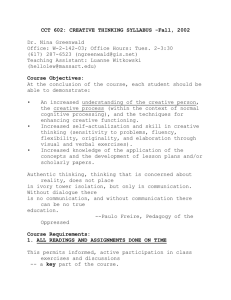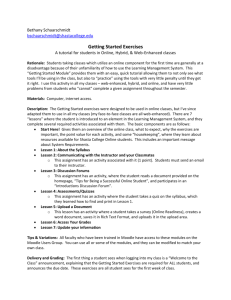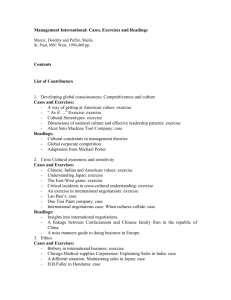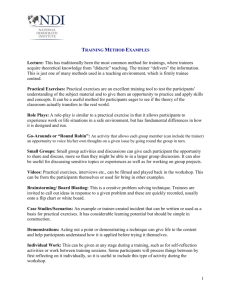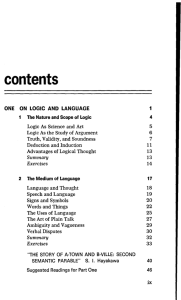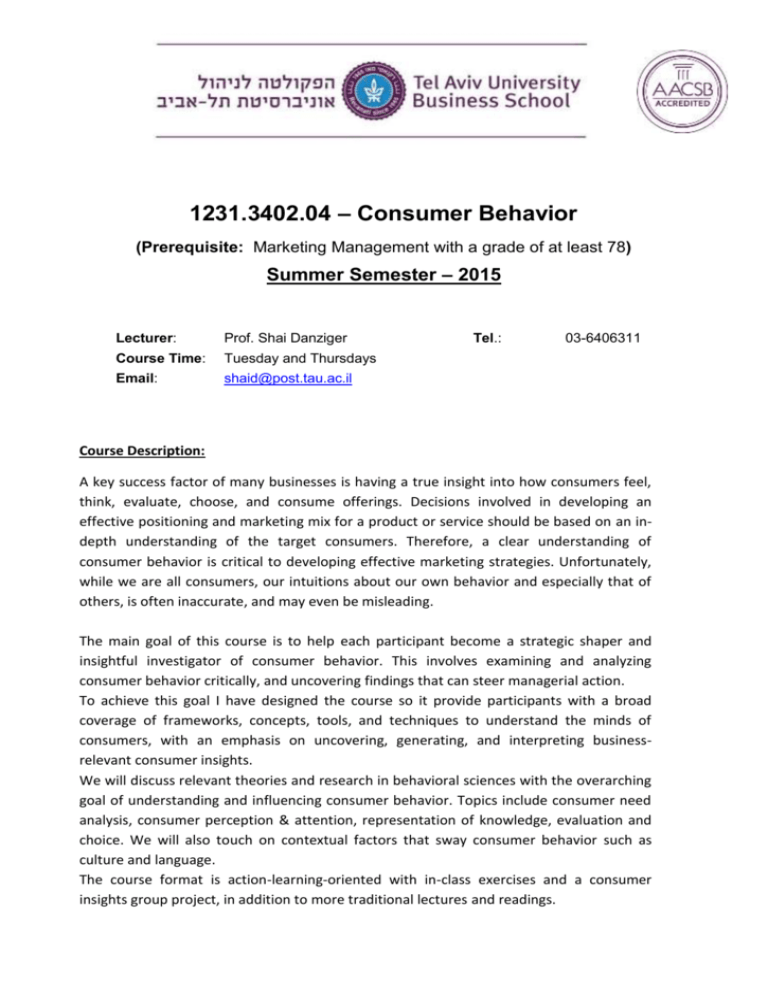
1231.3402.04 – Consumer Behavior
(Prerequisite: Marketing Management with a grade of at least 78)
Summer Semester – 2015
Lecturer:
Prof. Shai Danziger
Course Time:
Tuesday and Thursdays
Email:
shaid@post.tau.ac.il
Tel.:
03-6406311
Course Description:
A key success factor of many businesses is having a true insight into how consumers feel,
think, evaluate, choose, and consume offerings. Decisions involved in developing an
effective positioning and marketing mix for a product or service should be based on an indepth understanding of the target consumers. Therefore, a clear understanding of
consumer behavior is critical to developing effective marketing strategies. Unfortunately,
while we are all consumers, our intuitions about our own behavior and especially that of
others, is often inaccurate, and may even be misleading.
The main goal of this course is to help each participant become a strategic shaper and
insightful investigator of consumer behavior. This involves examining and analyzing
consumer behavior critically, and uncovering findings that can steer managerial action.
To achieve this goal I have designed the course so it provide participants with a broad
coverage of frameworks, concepts, tools, and techniques to understand the minds of
consumers, with an emphasis on uncovering, generating, and interpreting businessrelevant consumer insights.
We will discuss relevant theories and research in behavioral sciences with the overarching
goal of understanding and influencing consumer behavior. Topics include consumer need
analysis, consumer perception & attention, representation of knowledge, evaluation and
choice. We will also touch on contextual factors that sway consumer behavior such as
culture and language.
The course format is action-learning-oriented with in-class exercises and a consumer
insights group project, in addition to more traditional lectures and readings.
2
Course structure and learning style:
The course focuses on the consumer as an individual. We will begin with an overview of
what consumer behavior encompasses. We will then systematically examine the
consumer’s consumption journey from pre-purchase motivations and cognition to choice.
The topics comprise an examination of basic psychological processes in a logical sequence
using a combination of demonstrations and group exercises, and each session will focus on
a part of this sequence. At a more general level, we will emphasize the nature and
importance of consumer heterogeneity, social factors, and cultural differences in
consumer behavior throughout the course. Thus, the course provides both a micro and a
macro perspective of the factors that influence consumers.
Course requirements and grading:
Grades will be determined based on the following criteria
A final closed-book exam worth 87% of the final course grade. The test will be
based on the materials discussed in lectures, the readings for the consumer insights
project and the assigned mandatory articles. The test consists primarily of multiple-choice
questions and there will be a few short open-ended questions.
Submission of 4 exercises (each exercise is worth 2% of the grade – total 8%). You
will complete the exercises in groups of 2 or 3 individuals. You must submit the exercises
at the beginning of the class in which they are due.
Class attendance and participation (5% of final grade). Each person brings a unique
set of experiences, a unique perspective and knowledge to the classroom, and I would like
all class participants to tap into this diverse pool of resources and benefit from it. A portion
of class time will therefore be devoted to in-class discussions. Constructive contribution to
the class discussions and active listening are important elements of this course. It is
therefore essential that you be fully prepared to participate actively in class. This means
that you need to have read the assigned material prior to the class session. Effective
participation includes: (1) providing insightful questions and comments on concepts from
lectures and readings; (2) sharing your experience or point of view with the class; (3)
building on points raised by others; (4) clarifying issues; and (5) relating ongoing topics to
previous class discussions. Please keep in mind that bonus scores will be based on quality
of the comments and not their quantity.
Grading policy and logistics:
The Recanati Business School has a grade curving policy for all MA/MBA courses. The curve
is adhered to for the final grade of a course. As such, the average of grades in this elective
course will fall in the range between 83-87.
3
Virtual communication:
The course slides and readings will be available on the TAU Moodle website. Materials
may be updated during the semester. In any case, the presentation for a given class will
always be available a day before the session in which it will be discussed. Please make sure
to update your Recanati email address.
Mandatory reading:
(1) Power-point presentations in PDF format that accompany the course will be available
on Moodle. Please bring the notes to class.
(2) Four short articles and 4 short exercise readings (dates for reading the materials appear
in the course plan section)
A - The MPG illusion (Science)
B - Signing at the beginning makes ethics salient and decreases dishonest self-reports in
comparison to signing at the end (PNAS)
C- Female Hurricanes Are Deadlier Than Male Hurricanes (PNAS)
D– Extraneous factors in judicial decisions (PNAS)
* The exercises are from the text “Critical Thinking in Consumer Behavior: Cases and
Experiential Exercises. Judy Graham, Pearson, Prentice Hall, 2004”. These readings are
referred to as Exercises followed by the exercise number. They will be available on
moodle.
Recommended reading:
Consumer Behavior (4th-6th Edition) by Wayne D. Hoyer, Deborah J. MacInnis, and Rik
Pieters, South-Western, 2012. This is an excellent book that provides a relatively
encyclopedic reference to consumer behavior concepts, many of which we will discuss in
class.
Thinking fast and slow. (2011). Daniel Kahneman. An excellent book by an Israeli Nobel
prize winner.
Recommended Journals:
Journal of Consumer Research, Journal of Consumer Psychology, Journal of Marketing
Research, Journal of Marketing, Psychological Science,
http://www.myscp.org/pdf/SCP%20Consumer%20Psychology%20Syllabus%202014.pdf
4
Course plan and content:
Meeting 1: Overview of the field of consumer behavior
Meeting 2: Overview of the field of consumer behavior
Making consumer tick (Needs and Motivation)
Meeting 3: Making consumer tick (Reading: The MPG illusion; Exercise: Means end
analysis)
Meeting 4: Making consumer like and prefer my offerings (beliefs, attitudes and
preference) (Reading: Signing at the beginning makes ethics salient and
decreases dishonest self-reports in comparison to signing at the end;
Exercise: Multi-attribute theory)
Meeting 5: Making consumer like and prefer my offerings (beliefs, attitudes and
preference) (Reading; Female hurricanes are deadlier than male hurricanes;
Exercise: Attitude change strategies and the ELM)
Meeting 6: Increasing choice share (choice)
Meeting 7: Increasing choice share (choice) (Reading: Extraneous factors in judicial
decisions; Exercise: Choosing a camera)
** note that since the course format in the summer will be condensed, the ordering of
these topics will change slightly.


